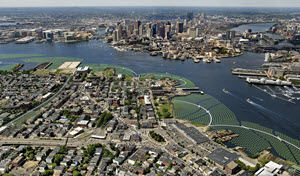Civil engineering is not a profession that lacks for great ideas. The 2019 ASCE Innovation Contest makes that much clear.
“The entries and winners have jumped another level higher in quality this year,” said Marc Hoit, Ph.D., F.SEI, F.ASCE, Innovation Contest chair and vice chancellor for information technology at North Carolina State University.
“This year’s winners are the best yet and should attract investors.”
ASCE’s Industry Leaders Council developed the Innovation Contest in 2015 as part of the strategy to address the ASCE Grand Challenge. Now in its fourth year, the Innovation Contest seeks out innovative ideas and gives them a platform for broader exposure.
This year’s contest honorees have been invited to a celebration event June 26-27 at ASCE headquarters in Reston, VA, where they’ll share their innovations with industry leaders and compete for $2,000 cash prizes for the Overall Grand Challenge Award and the Best Entrepreneur Award.
COMPETING FOR THE OVERALL GRAND CHALLENGE AWARD:
(All contest topic winners will compete for the Grand Challenge Award.)

The Emerald Tutu, submitted by Gabriel Cira, architect, Very Flat.
A floating landscape infrastructure, the Emerald Tutu mitigates the effects of climate change while providing a city with an inhabitable waterfront amenity.
The Emerald Tutu is the topic category winner for Sustainable Engineering.
Impact Protection of Bridges Using Meta-Material Revolved Shell Panels, submitted by Yasser Darwish, M.ASCE, graduate research assistant, Missouri University of Science and Technology.
These multiple bi-stable shells can dissipate up to 70 percent of the impact energy resulting from a vehicle collision with a crash barrier on bridges, highways, and roads.
Impact Protection of Bridges Using Meta-Material Revolved Shell Panels is the topic category winner for New Construction Materials and Methodology.

Load Bearing Structural Assembly, submitted by Bradford O’Kyle Russell, P.E., SECB, F.SEI, M.ASCE, director of BR Architects and Engineering. The assembly is uniquely designed to absorb and redirect forces on a structure produced by extreme events such as earthquakes or explosions.
Load Bearing Structural Assembly is the topic category winner for General Civil Infrastructure Improvement.

TieTran ROVE – NextGen Intelligent Electric Transit System, submitted by Suresh Babu Salla, managing director, Primerail Infralabs Private Limited.
TieTran ROVE is a smart, electric, on-demand, shared transit system that can move up to 5,000 people per hour per direction and moves autonomously on a guided infrastructure called Podloop.
TieTran ROVE – NextGen Intelligent Electric Transit System is the topic category winner for Next-Generation Transportation.
COMPETING FOR THE BEST ENTREPRENEUR AWARD:
(Contenders were nominated by the judging teams with the final selections made by the chief judge and contest chair.)
Smart Walls: Telescopic Structural Walls for Flood Protection, submitted by Jorge Cueto, Ph.D., Aff.M.ASCE, chief technology officer, Smart Walls Construction.
Smart Walls are deployable walls hidden in the ground that extend telescopically only when needed to stop flood waters.
iNgage-Me, submitted by Derrick Wesley, founder and owner of iMar Learning Solutions.
iNgage-Me is an educational program that combines current and future technology to change students’ learning experience and keeps them engaged in the learning process.
Load Bearing Structural Assembly

BEST STUDENT SUBMISSION WINNER:
Rapid Restoration of Deteriorated Prestressed Concrete Bridges Using Mechanically Fastened Fiber Reinforced Polymer, submitted by Brad C. McCoy, Ph.D., P.E., ENV SP, M.ASCE, Lieutenant Colonel, U.S. Army.
This methodology potentially extends the useful life of infrastructure at a low cost and can be installed in a matter of hours using common tools.
This year, for the first time, the Innovation Contest also included regional student competitions. The winners will compete in Reston next month in the national finals, with prize money for the top three finishers and one overall winner for the Best Student Entrepreneur securing funds for each students’ ASCE Student Chapters.
“Our ASCE student regional pilot contests produced quality as good as the regular contest – which this year is exceptional,” Hoit said. “The change in contest format will make the celebration even more exciting with winners chosen based on performance at the event.
“The celebration has also added more entrepreneurial coaching and benefits for the winners.”


